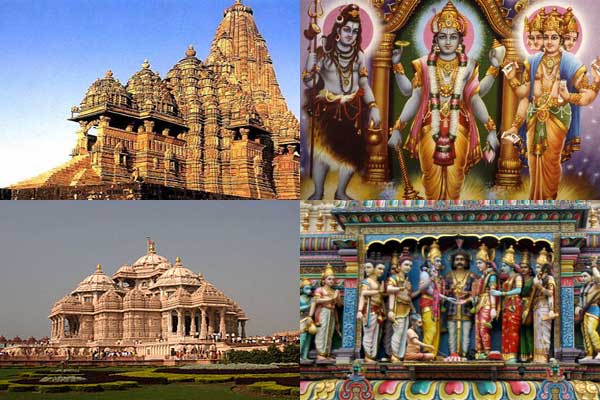Major Religions in INDIA
Hinduism

Hinduism, one of the world’s oldest religions, originated in the Indian subcontinent and is a diverse and complex faith with a rich tapestry of beliefs, practices, and traditions. It is often considered more a way of life than a strict belief system, with core tenets centered around concepts like Dharma (duty/ethics), Karma (action and consequence), and Moksha (liberation from the cycle of rebirth). Hinduism encompasses a wide array of deities, philosophies, and rituals, which vary significantly across different regions and communities. The religion is deeply rooted in sacred texts like the Vedas, Upanishads, Bhagavad Gita, and the epics Ramayana and Mahabharata, which provide spiritual guidance and moral teachings. Hinduism places emphasis on inner spirituality, the pursuit of truth, and reverence for nature, often guiding practitioners towards a path of harmony, respect, and balance in life.
Islam
Islam is a monotheistic religion founded in the 7th century CE in the Arabian Peninsula, based on the teachings of the Prophet Muhammad, who is regarded as the final messenger of God, or Allah. The core of Islamic belief centers on the Five Pillars: Shahada (faith), Salat (prayer), Zakat (charity), Sawm (fasting during Ramadan), and Hajj (pilgrimage to Mecca). Muslims follow the Quran, the holy book revealed to Muhammad, which provides spiritual guidance, moral teachings, and legal principles. Islam emphasizes submission to Allah, compassion, social justice, and the pursuit of righteousness. The faith has a rich spiritual and intellectual tradition and is practiced by over a billion people worldwide, forming a diverse and global community.
Christianity

Christianity is a monotheistic religion based on the life and teachings of Jesus Christ, who is regarded as the Son of God and the savior of humanity. Originating in the 1st century CE in the region of Judea, Christianity is founded on the belief in Jesus’s life, death, and resurrection, which Christians view as a path to salvation and eternal life. The religion’s sacred text, the Bible, comprises the Old and New Testaments, with the Gospels chronicling Jesus's life and teachings as the central focus of the New Testament. Key tenets of Christianity include love, compassion, forgiveness, and faith in God. The religion emphasizes following Jesus’s example and spreading his message of love and redemption. Today, Christianity is one of the world’s largest religions, practiced by diverse denominations and communities around the globe.
Sikhism

Sikhism is a monotheistic religion that originated in the Punjab region of India in the late 15th century, founded by Guru Nanak Dev Ji and further developed by a succession of nine Sikh Gurus. Sikhism emphasizes devotion to one God, known as Waheguru, and promotes values like equality, social justice, honest living, and selfless service. The Sikh scripture, Guru Granth Sahib, is considered the eternal Guru and contains the teachings of Sikh Gurus along with contributions from various saints and spiritual leaders. Sikhs strive to practice humility, compassion, and dedication to both spiritual and worldly responsibilities, aspiring to live in harmony with God's will. The religion rejects caste distinctions and rituals, advocating instead for a direct and personal connection with the divine. Sikhism has a strong cultural identity, symbolized by the Five Ks and the commitment to the community through charitable acts, known as Seva.
Jainism
Jainism is an ancient Indian religion rooted in principles of nonviolence (ahimsa), truth, and asceticism, traditionally traced back to the teachings of Lord Mahavira, the 24th Tirthankara, who lived in the 6th century BCE. Jainism teaches a path of spiritual development and self-discipline, aiming for liberation (moksha) from the cycle of rebirth through strict ethical practices and detachment from material possessions. Jains follow a code of conduct based on nonviolence toward all living beings, truthfulness, non-stealing, chastity, and non-possessiveness. Key scriptures include the Agamas, which contain the teachings of Mahavira and other Tirthankaras. Jainism emphasizes personal responsibility, meditation, and the development of wisdom, with a lifestyle that seeks to minimize harm to all forms of life. The religion is known for its rigorous commitment to nonviolence and its influence on Indian philosophy, culture, and ethics.
Buddhism

Buddhism is a non-theistic religion and philosophy founded by Siddhartha Gautama, known as the Buddha, in the 5th century BCE in ancient India. It centers on the Four Noble Truths, which explain the nature of suffering and the path to overcoming it, and the Eightfold Path, which provides a guide for ethical and mental development. Buddhists seek enlightenment, or Nirvana, which is freedom from the cycle of birth, death, and rebirth (samsara). Core principles of Buddhism include compassion, mindfulness, and the impermanence of all things. Key scriptures like the Tripitaka (Pali Canon) and Mahayana Sutras offer teachings that guide followers in meditation, morality, and wisdom. Buddhism has developed into several branches, including Theravada, Mahayana, and Vajrayana, each with unique practices but all emphasizing inner transformation and the pursuit of spiritual peace and understanding. Today, Buddhism is practiced widely across Asia and has influenced cultures and spiritual practices worldwide.